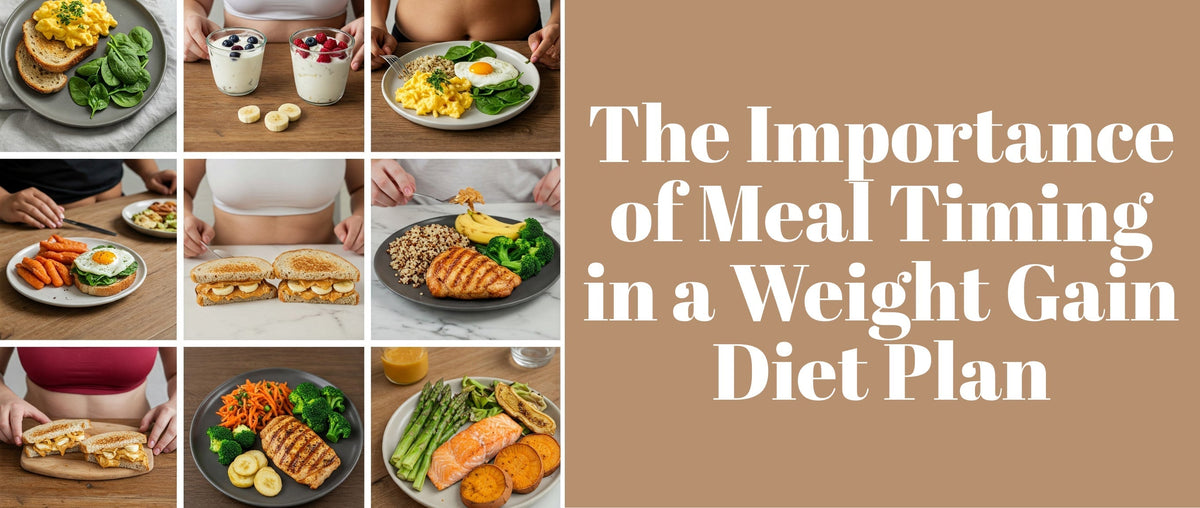The Importance of Meal Timing in a Weight Gain Diet Plan
Gaining weight is not just about eating more food—it’s about eating the right food at the right time. Many people struggle to achieve their weight gain goals because they focus only on increasing calories without considering meal timing.
Research suggests that when you eat can significantly impact muscle growth, fat storage, metabolism, and digestion. Your body follows a biological clock (circadian rhythm) that regulates hormone production, energy expenditure, and nutrient absorption. If you don’t align your meals with your body’s natural rhythms, you might experience inefficient weight gain, poor digestion, and increased fat storage instead of muscle growth.
This article explores the science behind meal timing, its impact on weight gain, and the best meal schedule for effective results.
How Meal Timing Affects Weight Gain
The Science Behind Weight Gain
Weight gain occurs when you consume more calories than you burn. However, the distribution of those calories throughout the day plays a key role in how efficiently they are used for muscle building rather than fat storage.
Here’s how meal timing influences weight gain:
| Factor | Effect on Weight Gain |
|---|---|
| Consistent meal timing | Supports muscle growth and stabilizes metabolism |
| Skipping meals | Increases hunger hormones, leading to muscle breakdown |
| Eating frequent meals | Helps maintain a calorie surplus for sustained weight gain |
| Late-night eating | Can cause excess fat storage if meals are not well-balanced |
| Post-workout nutrition | Enhances muscle recovery and optimizes protein synthesis |
When meals are properly timed, nutrients are utilized more effectively, leading to better muscle gain and minimal fat accumulation.
The Role of Circadian Rhythm in Meal Timing
Your body operates on a circadian rhythm, a 24-hour internal clock that affects metabolism and digestion. Aligning your meal schedule with your circadian rhythm enhances nutrient absorption, digestion efficiency, and energy utilization.
- Morning (6 AM - 10 AM): Insulin sensitivity is high, making it the best time to consume carbohydrates and protein.
- Afternoon (12 PM - 4 PM): Metabolism peaks, which is ideal for high-calorie meals.
- Evening (6 PM - 9 PM): Digestion slows, so meals should be balanced with protein and healthy fats.
- Night (10 PM - 2 AM): The body focuses on repair and recovery, making a pre-sleep meal beneficial for muscle growth.
A well-timed eating pattern can maximize weight gain while preventing unnecessary fat accumulation.

Contribution of Gut Microbiome Changes to Weight Gain
Your gut microbiome, the community of bacteria in your digestive system, changes throughout the day and affects how your body processes food. Recent studies suggest that meal timing influences gut bacteria, which in turn impacts nutrient absorption and fat storage.
- Morning: Gut bacteria are most active, helping with digestion and metabolism.
- Afternoon: The gut efficiently processes high-calorie meals, supporting muscle growth.
- Night: Digestive activity decreases, and excess calories are more likely to be stored as fat.
By timing your meals according to your gut’s natural activity, you can improve digestion and enhance weight gain efficiency.
Time-of-Day-Based Nutritional Strategy for Weight Gain
The timing of each meal plays a crucial role in how nutrients are processed and stored. Following a structured meal plan helps ensure maximum muscle growth and energy efficiency.
Morning (6 AM - 9 AM): Power Breakfast
- Should be high in protein and complex carbohydrates to kickstart metabolism.
- Examples: Oatmeal with peanut butter, eggs with whole wheat toast, smoothie with nuts and banana.
Mid-Morning Snack (10 AM - 11 AM)
- Prevents energy crashes and maintains a steady calorie intake.
- Examples: Greek yogurt with granola, banana with almond butter, nuts and seeds mix.
Lunch (12 PM - 2 PM): Largest Meal of the Day
- Metabolism is at its peak, making it the ideal time for high-calorie intake.
- Should include balanced macronutrients:
- Proteins: Chicken, tofu, paneer, fish
- Carbohydrates: Rice, quinoa, whole wheat bread
- Healthy fats: Avocado, nuts, olive oil
Afternoon Snack (3 PM - 4 PM)
- Prepares the body for an evening workout or activities.
- Examples: Protein smoothie, hummus with whole-grain crackers, fruit with peanut butter.
Dinner (7 PM - 8 PM)
- Moderate in calories but rich in protein for muscle recovery.
- Examples: Grilled salmon with roasted vegetables, quinoa salad, lentil soup.
Pre-Sleep Snack (9 PM - 10 PM)
- Supports muscle repair and overnight growth.
- Examples: Casein protein shake, cottage cheese with walnuts, a handful of almonds.
Also Read
Intermittent Fasting and Weight Gain: Does It Work?
Intermittent fasting is often associated with weight loss, but it can also be used strategically for healthy weight gain.
- Time-Restricted Eating (TRE): Eating within an 8-10 hour window helps maintain a controlled calorie surplus while avoiding excessive fat gain.
- Best fasting schedule for weight gain: 16:8 method (16 hours of fasting, 8 hours of eating).
- Key to success: Ensuring high-calorie, nutrient-dense meals during the eating window.
By carefully planning meals within a restricted timeframe, intermittent fasting can support muscle growth without excess fat accumulation.
Sample Meal Plan for Weight Gain (With Timings)
| Time | Meal | Example Foods |
|---|---|---|
| 7:00 AM | Breakfast | Oatmeal with peanut butter, banana, milk |
| 10:00 AM | Snack | Greek yogurt with granola, mixed nuts |
| 1:00 PM | Lunch | Brown rice, grilled chicken/paneer, vegetables |
| 4:00 PM | Snack | Protein smoothie, whole grain toast with hummus |
| 8:00 PM | Dinner | Quinoa, lentil soup, roasted vegetables |
| 10:00 PM | Pre-Sleep Snack | Cottage cheese, walnuts, herbal tea |
Common Mistakes in Meal Timing for Weight Gain
- Skipping meals: Slows metabolism and leads to muscle loss.
- Eating too late at night: Increases fat storage if calorie intake is excessive.
- Inconsistent eating patterns: Causes fluctuations in energy levels and digestion issues.
- Ignoring post-workout nutrition: Reduces muscle recovery and growth potential.
Conclusion: Optimizing Meal Timing for Healthy Weight Gain
Meal timing plays a vital role in achieving effective weight gain. By aligning food intake with the body’s biological clock, you can maximize nutrient absorption, enhance muscle growth, and prevent fat accumulation.
A structured eating schedule ensures a steady caloric surplus without compromising metabolic health. Following a well-balanced meal timing strategy will help you gain weight efficiently and sustainably.
Start implementing strategic meal timing today and take control of your weight gain journey.
Do you enjoy vegan food? We have a list of vegan restaurants in India to help you find delicious options in your area!










